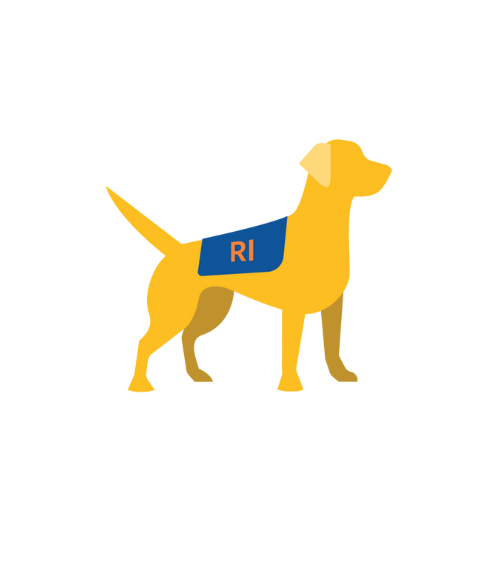Retrieving Independence Statement Regarding Recent Claims
Nashville, Tenn. (January, 26, 2023)
General Information about Retrieving Independence’s History
Retrieving Independence was founded in 2012 as an entirely volunteer-led organization. In 2017, Retrieving Independence established a small part-time staff and, in 2019, was able to hire its first full-time CEO overseeing those part-time staff members. Over time, there have been a great deal of changes in capacity and staffing to best meet the needs of the entity. Currently, the staff consists of two full-time employees and five part-time employees. In 2024, Retrieving Independence intends to (a) add an additional full-time trainer position, (b) expand two part-time positions to full-time, and (c) fill one part-time position, bringing the total staff size to five full-time employees and three part-time employees. Over its 11 years in operation, Retrieving Independence has grown, adapted, and implemented new policies and procedures with the objective of delivering the highest possible quality of programming and placements for all its constituents. This includes Retrieving Independence seeking accreditation through as an Assistance Dogs International Candidate. The accreditation process has taken time and requires developing and implementing those process and procedures to meet ADI guidelines.
To that end, Retrieving Independence has always done its best to breed, train and place service dogs to a high standard and to (a) advocate for the wellbeing of its service dogs in training and (b) the success of its clients, while celebrating the accomplishments of its inmate trainers and volunteers. In any instance where clients have had issues or complaints, Retrieving Independence has strived to accommodate and/or remedy those issues by taking all reasonable efforts to provide additional assistance.
The recent claims being brought forth range from false and defamatory to a serious misrepresentation and mischaracterization of the facts related to Retrieving Independence and its program, staff, and officers. As a result of these claims being made publicly Retrieving Independence staff have been subjected to aggressive and disturbing phone calls and messages, and the organization has been targeted for negative reviews based on false or mischaracterized information by individuals who have no direct experience or contacts with the organization. The staff and volunteers at Retrieving Independence deserve to do their jobs every day without fear of harassment and the extent of this rhetoric has made safety of our clients and volunteers operating with an RI service dog or service dog in training in public a concern. This is unacceptable.
In order to directly address some of the allegations set forth, Retrieving Independence wishes to provide the following responses/information:
Claims Regarding Retrieving Independence’s Training Staff
Retrieving Independence has never been without a qualified trainer at any time. Any claim otherwise is patently false.
Claims Regarding Retrieving Independence’s Breeding Program
Any insinuation or statement that Retrieving Independence uses dogs released from the service training program for its breeding program is also false. Retrieving Independence does not and has not used dogs released from its service dog training program for its breeding program. Retrieving Independence carefully and intentionally selects dogs from its program to become breeder dogs for future litters, which requires them to not be spayed/neutered. These dogs are assessed for aptitude and appropriateness for this. Any dog that is in the program and continues its training to be released will have already been spayed or neutered and would not be able to be considered for breeding. Retrieving Independence is excited to be expanding its breeding program by bringing in puppies from other ADI certified programs, specifically those who have proven success rates in graduating from prison programs as service dogs. This should enable Retrieving Independence to continue improving the quality of its breeding program, training, and placements.
Claims Regarding Aggression in Dogs at Retrieving Independence
Retrieving Independence takes any and all displays of aggression extremely seriously and takes all reasonable efforts to address the situation. Any claims to the contrary are both harmful and reckless when directed towards an entity and individuals who have experienced the unique grief that comes with loving and losing a truly aggressive dog and being tasked with ending its suffering for the safety of itself and others.
It is mandatory for all parties to report any incidents to both training staff and directly to the CEO. Retrieving Independence is not aware of an incident taking place whereby any handler was injured. If indeed an incident has taken place with an RI dog that resulted in injury to the handler, it has not been reported to RI, and RI has not been provided adequate information or communication to assess or respond to the incident accordingly. In any case of aggression or injury, Retrieving Independence would consider a totality of circumstances to determine that a service dog’s appropriateness to continue service work, using the judgment of trainers and other professionals. Retrieving Independence encourages the handler of the dog in question to contact them immediately to discuss this alleged incident as soon as possible.
There are also allegations related to an incident between an RI service dog in training and an RI service dog that occurred in June of 2022. Without identifying individuals involved or addressing the specific circumstances, Retrieving Independence unequivocally states that this incident was due to the handler of the service dog directly disregarding Retrieving Independence’s instructions and protocols.
- The incident was immediately reported to RI’s trainer at that time, and the service dog in training was then carefully and continuously monitored, evaluated, and assessed by multiple staff, inmates and volunteers for any potential aggression, guarding, or other inappropriate behaviors and was found to have no patterns of these behaviors that would prevent his continued training and placement. His client, however, was made aware that he was being monitored for these behaviors following the incident, and that there was a possibility he would be released from the program and a rematch would be made.
- Using the judgment of trainers and professionals, it was determined that this was an isolated incident that could happen between two dogs at any time, even fully trained service dogs who behave appropriately in public. To represent this dog as violent, aggressive, or this incident as an “attack” puts the dog at risk, is unfair to his former client, who made a difficult and agonizing decision to return him to the organization for reasons unrelated to his behavior or tasking abilities.
- The client and service dog met with RI’s CEO and informed her of the incident. The CEO took the incident very seriously and expressed great concern for the wellbeing of the client and the service dog. During this meeting, the client expressed that both she and the service dog were doing well, and she expressed no concern or desire for the service dog in training to be removed from the program or for his placement to not continue.
- In addition, the client on several occasions spent time willingly with the dog (after his graduation and placement) and his client personally and in training sessions arranged by RI. These are not the actions of an individual that believes a dog is a threat to their dog, any other dog, or indeed a person. RI firmly asserts that it does not, has not, and would not knowingly or willingly place any dog with any person or facility that was a demonstrated risk to people or pets.
Claims Regarding Retrieving Independence Graduating Dogs Not Trained to Appropriate Standards or Fully Task Trained
Retrieving Independence does not believe it has graduated dogs that are not fully task-trained. There have been occasions where additional task requests or changes have been made close to graduation date and were not able to be accommodated, but those were outside the scope of the original training.
Additionally, Retrieving Independence has never knowingly allowed a dog through to graduation with awareness that it does not fully meet ADA or public access standards. In any instance where those behaviors were displayed at camp that were not deemed to be isolated or due to the transition, Retrieving Independence has made the difficult decision to pull the dog and rematch the client. Like any organization, Retrieving Independence is proud of its positive growth and adaptiveness to the needs of its dogs and clients over time.. Any clients who have experienced issues with their service dogs continue to be offered ongoing support at no additional cost to them, and this can be offered in numerous ways.
Lastly, the client camp reiterates that a service dog is one tool of many to mitigate a disability and that a person and their service dog is a team that must work together. The training lasts for a lifetime, and it requires dedication and effort by all parties. Without ongoing tasking, practice, input and work, a dog’s training and abilities will not remain consistent. As with training companion animals and their families, in the world of assistance animals, much of the training provided post-placement is to the client regarding enrichment, weight maintenance, and communication with their service animal. There are of course occasions where we see behaviors with a service dog that need troubleshooting also and we are more than happy to provide additional support to address it.
Claims Regarding Client Support
No Retrieving Independence client has ever been sent a cease-and-desist letter for seeking post-placement support from Retrieving Independence. This claim is false.
Retrieving Independence provides all clients with one year of monthly post-placement follow-up, which is offered in a multitude of formats: one-on-one check-ins, a Facebook group, or group calls. Under old policies, post-placement support ceased after one year, although typically Retrieving Independence has stayed in touch with the majority of its clients. Clients are also continually able to attend our group training sessions and have access to our training staff for any questions or issues they are having beyond their first year of placement. To comply with ADI standards, Retrieving Independence is now continuing post-placement follow-up throughout the working life of its service dogs. ADI is aware of our previous standard and our efforts to meet theirs. Retrieving Independence acknowledges that there have been brief periods of time where post-placement support has lapsed due to staffing capacity and turnover. In these instances, post-placement support has been extended beyond a year.
Additional Information Regarding Claims and Funds for Service Dog Placements
In the event of an unsuccessful placement, in which a rematch with another service dog is not successful/not appropriate, it is possible for Retrieving Independence and the client to exit the initial Service Dog Agreement. Any funds given to Retrieving Independence for the training and placement of the service dog are eligible to be returned, directly to the individual or individuals who made the transaction in the first place. In many cases, this is not the individual who ultimately is the recipient of the service dog, and therefore there is no instance in which they would be legally entitled to those funds.
###
About Retrieving Independence
Retrieving Independence is a 501(c)(3) non-profit organization founded in 2012 with a mission to harness love, dignity, and change to transform lives through the human-animal bond. Retrieving Independence’s service dog training program gives greater independence to people living with physical, emotional, or mental disabilities; offers rehabilitation to inmate trainers at two Tennessee prison facilities, and creates community for our dedicated volunteers.
Media Contact: Lauren Dougall | (615) 554-8643 | lauren@riservicedogs.org


